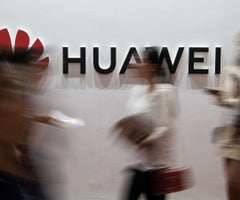MI SELECCIÓN DE NOTICIAS
Noticias personalizadas, de acuerdo a sus temas de interés

Huawei is pushing back more forcefully against the U.S., as it seeks to overturn Washington’s efforts to exclude it from 5G network rollouts world-wide.
Under fire from the Trump administration, China’s Huawei Technologies Co. has approached high-profile figures in Washington to try to turn around negative perceptions of the company.
Among those contacted are Abbe Lowell, a lawyer who has represented President Trump’s son-in-law Jared Kushner, and Marcus Brauchli, the former executive editor of the Washington Post and former managing editor of The Wall Street Journal.
Huawei has approached at least six such figures seeking their help as the company navigates challenges posed by the U.S. government and tries to change how it is covered by the media, people familiar with the initiative say. Some individuals approached by Huawei met with staff of the Chinese telecom company at its New York offices earlier this month to discuss company strategy, these people said.
Others who have spoken to Huawei told the Journal they discussed the company’s legal and regulatory obstacles in the U.S. and how to overcome them. Huawei was considering the possibility of hiring such advisers, according to a person familiar with the matter. Both Huawei and the individuals reached by the Journal whose expertise the company has sought say they weren’t compensated.
Mr. Brauchli acknowledged meeting with officials at Huawei but said he wasn’t acting as a paid consultant and had no intention of doing so. Mr. Brauchli is managing partner at North Base Media, a media-focused venture-capital firm.
Mr. Lowell didn’t respond to requests for comment. A partner at law firm Winston & Strawn, Mr. Lowell has represented a string of prominent public officials, including former Democratic vice presidential candidate John Edwards and Sen. Bob Menendez (D., N.J.)
“Like most leading companies, Huawei sometimes relies on industry experts, consulting firms and advisory boards across the breadth of our business to ensure we’re operating in the most effective manner possible,” a Huawei spokesman said in a statement. Huawei has “no current contracts with third-party advisers outside of our usual consultants.”
Huawei is pushing back more forcefully against the U.S., as it seeks to overturn Washington’s efforts to exclude it from 5G network rollouts world-wide. The company wants to reshape the narrative that it enables state espionage by Beijing, an accusation it has contested. Huawei’s lobbying spending soared last year, as it enlisted well-known firms such as Steptoe & Johnson and Squire Patton Boggs, according to disclosures.
The U.S. has raised the stakes for Huawei in recent weeks. It has expanded an existing indictment of the company alleging sanctions evasion, adding charges of racketeering and new allegations of intellectual-property theft. Huawei denies the charges. The Trump administration, meanwhile, is considering tightening a blacklist of Huawei that has restricted its access to U.S. technology, the Journal reported earlier this month.
Huawei is the world’s largest maker of telecom equipment and the No. 2 vendor of smartphones, ahead of Apple Inc. and behind Samsung Electronics Co., though its products have been effectively unavailable in the U.S. after a 2012 Congressional report branded it a security threat.
Like many big corporations, Huawei relies on a stable of lawyers, public-relations firms and other paid consultants to help manage its affairs around the world. In Western countries, the company has a history of hiring prominent figures to represent it. In 2015, the company named John Browne, the former chief executive of BP PLC, as chairman of its U.K. board of directors. The chairman of its Australian unit is John Lord, a former rear admiral in the country’s navy.
In the U.S., Huawei has traditionally taken a more subdued approach, biding its time and waiting for market openings since the 2012 Congressional report. It primarily operates research-and-development offices-which have downsized considerably in the past year-and sells equipment to small rural carriers.
Its strategy in the U.S. has become more aggressive as the Trump administration’s opposition to Huawei has intensified. The company launched a series of lawsuits in the U.S., including one seeking to reverse a ban on federal agencies from buying its gear, and another seeking to overturn restrictions on its business with rural carriers by the Federal Communications Commission.
Other figures that Huawei has approached about its U.S. image-enhancing effort include Jason Pontin, a senior adviser at Flagship Pioneering, a venture-capital firm. Mr. Pontin, a longtime technology journalist, is former publisher and editor in chief of the MIT Technology Review.
Mr. Pontin said he attended the New York meeting “at Huawei’s suggestion where I offered some mild advice on their predicament.” He added: “My sole personal interest is that, as a friend of China and a technologist, I’d prefer there not to be a fracturing of standards and supply chains.”
Ian Bremmer, president of Eurasia Group, a political-risk consulting firm, said he has met individually with Huawei officials to discuss the company’s challenges in the U.S. He said he believes it is important for the company to have an understanding of the U.S. and its policies.
“I’ve been happy to engage with them and I’ve been trying to tell them why I think the United States is not particularly receptive to their entreaties,” he said. “I suspect they’d be interested in being a client but we have no interest in doing that,” he added, saying his company doesn’t “take money from companies from places that don’t have rule of law.”
By Dan Strumpf
El crudo Brent, referencia mundial, subió inicialmente sólo un 0,7% hasta US$91,05 el barril en las primeras operaciones, antes de cotizar plano
La entidad internacional esperaba que Colombia creciera en 2024 a nivel de 1,3%, nuevamente actualizó su proyección a la baja
"El Tesoro no dudará en trabajar con nuestros aliados para utilizar nuestra autoridad de sanciones" fue el mensaje de la funcionaria